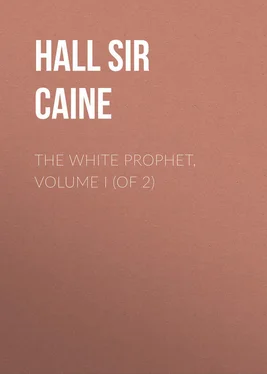Hall Caine - The White Prophet, Volume I (of 2)
Здесь есть возможность читать онлайн «Hall Caine - The White Prophet, Volume I (of 2)» — ознакомительный отрывок электронной книги совершенно бесплатно, а после прочтения отрывка купить полную версию. В некоторых случаях можно слушать аудио, скачать через торрент в формате fb2 и присутствует краткое содержание. Жанр: foreign_antique, foreign_prose, на английском языке. Описание произведения, (предисловие) а так же отзывы посетителей доступны на портале библиотеки ЛибКат.
- Название:The White Prophet, Volume I (of 2)
- Автор:
- Жанр:
- Год:неизвестен
- ISBN:нет данных
- Рейтинг книги:5 / 5. Голосов: 1
-
Избранное:Добавить в избранное
- Отзывы:
-
Ваша оценка:
- 100
- 1
- 2
- 3
- 4
- 5
The White Prophet, Volume I (of 2): краткое содержание, описание и аннотация
Предлагаем к чтению аннотацию, описание, краткое содержание или предисловие (зависит от того, что написал сам автор книги «The White Prophet, Volume I (of 2)»). Если вы не нашли необходимую информацию о книге — напишите в комментариях, мы постараемся отыскать её.
The White Prophet, Volume I (of 2) — читать онлайн ознакомительный отрывок
Ниже представлен текст книги, разбитый по страницам. Система сохранения места последней прочитанной страницы, позволяет с удобством читать онлайн бесплатно книгу «The White Prophet, Volume I (of 2)», без необходимости каждый раз заново искать на чём Вы остановились. Поставьте закладку, и сможете в любой момент перейти на страницу, на которой закончили чтение.
Интервал:
Закладка:
Other things happened immediately and the Colonel had forgotten his order, when, the battle being over and the British and Egyptian army about to enter the dirty and disgusting city of the Khalifa, he became aware that Gordon Lord was riding beside him with a black banner in one hand and some broken pieces of horse's reins in the other.
"Bravo! You've got it, then," said the Colonel.
"Yes, sir," said Gordon, very sadly; and the Colonel saw that there were tears in the boy's eyes.
"What's amiss?" he said, and looking round, "Where's Ali?"
Then Gordon told him what had happened. They had captured the dervish and compelled him to give up his spear and rifle, but just as Ali was leading the man into the English lines, the demon had drawn a knife and treacherously stabbed him in the back. The boy choked with sobs while he delivered his comrade's last message: "Say good-bye to the Colonel, and tell him Ali Awad was not a coward. I didn't let go the Baggara's horse until he stuck me, and then he had to cut the reins to get away. Show the bits of the bridle to my Colonel, and tell him I died faithful. Give my salaams to him, Charlie. I knew Charlie Gordon Lord would stay with me to the end."
The Colonel was quite broken down, but he only said, "This is no time for crying, my boy," and a moment afterwards, "What became of the dervish?" Then, for the first time, the fighting devil flashed out of Gordon's eyes and he answered —
"I killed him like a dog, sir."
It was the black flag of the Khalifa himself which Gordon had taken, and when the Commander-in-Chief sent home his despatch he mentioned the name of the young soldier who had captured it.
From that day onward for fifteen years honours fell thick on Gordon Lord. Being continually on active service, and generally in staff appointments, promotions came quickly, so that when he went to South Africa, the graveyard of so many military reputations, in those first dark days of the nation's deep humiliation when the very foundations of her army's renown seemed to be giving way, he was one of the young officers whose gallantry won back England's fame. Though hot-tempered, impetuous, and liable to frightful errors, he had the imagination of a soldier as well as the bravery that goes to the heart of a nation, so that when in due course, being now full Colonel, he was appointed, though so young, Second in Command of the Army of Occupation in Cairo, no one was surprised.
All the same he knew he owed his appointment to his father's influence, and he wrote to thank him and to say he was delighted to return to Cairo. Only at intervals had he heard from the Consul-General, and though his admiration of his father knew no limit and he thought him the greatest man in the world, he always felt there was a mist between them. Once, for a moment, had that mist seemed to be dispelled when, on his coming of age, his father wrote a letter in which he said —
"You are twenty-one years of age, Gordon, and your mother and I have been recalling the incidents of the day on which you were born. I want to tell you that from this day forward I am no longer your father; I am your friend; perhaps the best friend you will ever have; let nothing and no one come between us."
Gordon's joy on returning to Egypt was not greater than that of the Egyptians on receiving him. They were waiting in a crowd when he arrived at the railway station, a red sea of tarbooshes over faces he remembered as the faces of boys, with the face of Hafiz, now a soldier like himself, beaming by his carriage window.
It was not good form for a British officer to fraternise with the Egyptians, but Gordon shook hands with everybody and walked down the platform with his arm round Hafiz's shoulders, while the others who had come to meet him cried, "Salaam, brother!" and laughed like children.
By his own choice, and contrary to custom, quarters had been found for him in the barracks on the bank of the Nile, and the old familiar scene from there made his heart leap and tremble. It was evening when at last he was left alone, and throwing the window wide open he looked out on the river flowing like liquid gold in the sunset, with its silent boats, that looked like birds with outstretched wings, floating down without a ripple, and the violet blossom of the island on the other side spreading odours in the warm spring air.
He was watching the traffic on the bridge – the camels, the cameleers, the donkeys, the blue-shirted fellaheen, the women with tattooed chins and children astraddle on their shoulders, the water-carriers with their bodies twisted by their burdens, the Bedouins with their lean, lithe, swarthy forms and the rope round the head-shawls which descended to their shoulders – when he heard the toot of a motor-horn, and saw a white automobile threading its way through the crowd. The driver was a girl, and a veil of white chiffon which she had bound about her head instead of a hat was flying back in the light breeze, leaving her face framed within, with its big black eyes and firm but lovely mouth.
An officer in general's uniform was sitting at the back of the car, but Gordon was conscious of the man's presence without actually seeing him, so much was he struck by the spirit of the girl, which suggested a proud strength and self-reliance, coupled with a certain high gaiety, full of energy and grace.
Gordon leaned out of his window to get a better look at her, and, quick as the glance was, he thought she looked up at him as the motor glided by. At the next instant she had gone, and it seemed to him that in one second, at one stride, the sun had gone too.
That night he dined at the British Agency, but he did not stay late, thinking his father, who looked much older, seemed preoccupied, and his mother, who appeared to be more delicate than ever, was over-exciting herself; but early next morning he rode up to the Citadel to pay his respects to his General in Command, and there a surprise awaited him. General Graves was ill and unable to see him, but his daughter came to offer his apologies – and she was the driver of the automobile.
The impression of strength and energy which the girl bad made on him the evening before was deepened by this nearer view. She was fairly tall, and as she swung into the room her graceful round form seemed to be poised from the hips. This particularly struck him, and he told himself at that first moment that here was a girl who might be a soldier, with the passionate daring and chivalry of women like Joan of Arc and the Rani of Jhansi.
At the next moment he had forgotten all about that, and under the caressing smile which broke from her face and fascinated him, he was feeling as if for the first time in his life he was alone with a young and beautiful woman. They talked a long time, and he was startled by an unexpected depth in her voice, while his own voice seemed to him to have suddenly disappeared.
"You like the Egyptians – yes?" she asked.
"I love them," said Gordon. "And coming back here is like coming home. In fact, it is coming home. I've never been at home in England, and I love the desert, I love the Nile, I love everything and everybody."
She laughed – a fresh, ringing laugh that was one of her great charms – and told him about herself and her female friends; the Khediviah, who was so sweet, and the Princess Nazimah, who was so amusing, and finally about the Sheikh who for two years had been teaching her Arabic.
"I should have known you by your resemblance to your mother," she said, "but you are like your father, too; and then I saw you yesterday – passing the barracks, you remember."
"So you really did … I thought our eyes – "
His ridiculous voice was getting out of all control, so he cleared his throat and got up to go, but the half smile that parted her lips and brightened her beautiful eyes seemed to say as plainly as words could speak, "Why leave so soon?"
Читать дальшеИнтервал:
Закладка:
Похожие книги на «The White Prophet, Volume I (of 2)»
Представляем Вашему вниманию похожие книги на «The White Prophet, Volume I (of 2)» списком для выбора. Мы отобрали схожую по названию и смыслу литературу в надежде предоставить читателям больше вариантов отыскать новые, интересные, ещё непрочитанные произведения.
Обсуждение, отзывы о книге «The White Prophet, Volume I (of 2)» и просто собственные мнения читателей. Оставьте ваши комментарии, напишите, что Вы думаете о произведении, его смысле или главных героях. Укажите что конкретно понравилось, а что нет, и почему Вы так считаете.












